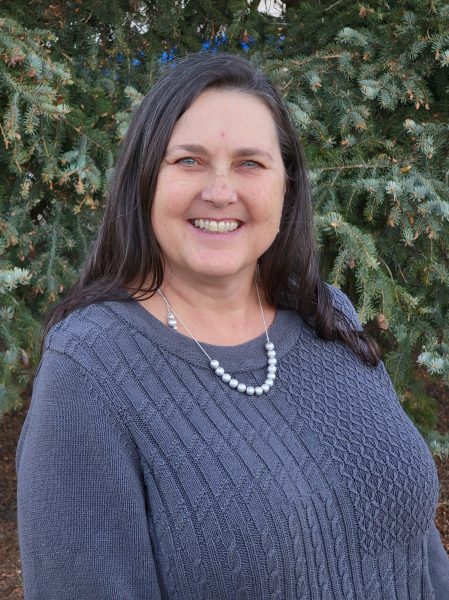Slow and Steady Wins the Degree
CSU Human Resources Specialist Earns her Anthropology
Joshua Zaffos
Shelly Lynch came to work in Human Resources at Colorado State University in June 1993, building a lifelong career and earning her share of promotions and new responsibilities on campus over the years while also raising a family. This weekend, she will add a new accolade to her CSU credentials, earning a Bachelor of Arts in Anthropology.
Lynch, who currently works as a Human Resources Operations Specialist in the College of Agricultural Sciences, got her degree basically one to two courses each semester over roughly seven years, taking advantage of the Employee Study Privilege benefit, which allows university employees to take up to nine credit hours of courses per year without the assessment of the student portion of tuition or general fees.
“Shelly is an inspiration and such a great example of how – with enough determination – you can earn your degree in a manner that works for you,” said Keri Canada, Anthropology instructor and Academic Success Coordinator for the Department of Anthropology and Geography. “I was also lucky enough to have Shelly in my Anthropology of Sex and Reproduction (ANTH 333) course this semester, and I have been continually impressed with the quality of her work – particularly in a semester when I knew she was balancing a full-time job and her capstone research. We’ve been so lucky to have Shelly as part of our department and I feel personally honored to have been able to witness her journey.”
We caught up with Lynch to talk about her journey, accomplishments, and lessons learned and applied between anthropology and human resources.

What led you to study anthropology while holding down a human-resources job?
When I came here in June ’93, I actually started [taking classes] in January ’94. I was studying Botany and also took Introduction to Cultural Anthropology (ANTH 100). I did that [taking 1-2 classes each semester] until spring semester ’99. That was when I had my first baby, and fall of ’99, I took my first break, which then of course became a 14-plus-year break.
I came back in the fall of 2015. In that time, the Botany degree went away, and I really liked that Cultural Anthropology class that I took way back so I decided, I’m going to go for it. I decided almost immediately when I enrolled [in her first semester back at CSU] that I was going to do general Anthropology (Bachelor of Arts).
What about anthropology spoke to you as a person and an adult learner?
It’s a funny story: My parents took me on a field trip down to Mesa Verde and to the ruins in Farmington, New Mexico, when I was in 4th grade and I did not even know that [cultural resources management, archaeology, and anthropology] was a job or anything. At my little 5th grade graduation, when it was, “What did I want to be when I grow up?” It was, “An archaeologist.” So, this and my love and interest in the past and history has always been there for me.
With being a general Anthropology major, I knew I liked the Biological Anthropology discipline, but I didn’t want to go there completely and the department made it easy to just kind of mix it around and do general Anthropology. [Anthropology majors at CSU can choose a general undergraduate degree track or a concentration in Archaeology, Biological Anthropology, or Cultural Anthropology.]
What is it like to complete a degree over years like this?
You know, it was hard to draw upon information from classes that you literally took years ago, to pull that up [mentally] when I would go to the advanced classes. That’s the only con I have in the whole thing. But slow and steady wins the race, and it worked out for me.
How does anthropology help you approach your work in human resources?
The holistic approach of anthropology is just way important in any field — to recognize how to get all perspectives and how to consider things from all angles. The cultural aspect, of course, has been amazing to help with thinking about our goals here of inclusivity and diversity, learning and taking into consideration where people are coming from and their different cultures and learned beliefs.
What anthropology has taught me that will really help at my job now is, as unbiased as I may feel, my lens has my bias and I need to always consult different perspectives and always get as much information from all views. That’s a really cool thing about anthropology, and is really going to help me further my HR career.
Do you have a favorite class or professor from your time?
Definitely. Evolutionary Medicine and Human Health (ANTH 379) with Dr. Melissa Raguet-Scofield really hit home for me, relating our ancient past and what we’re doing now globally with human health and our environment.
Also, Professor Kim Nichols – she is the epitome of someone who loves to teach.
Congratulations! It’s been a long and persevering journey!
Thanks! One more thing that is cool is that my son [Daniel Lynch] is graduating from CSU, with a degree in Soil and Crop Sciences, on the same day with me!